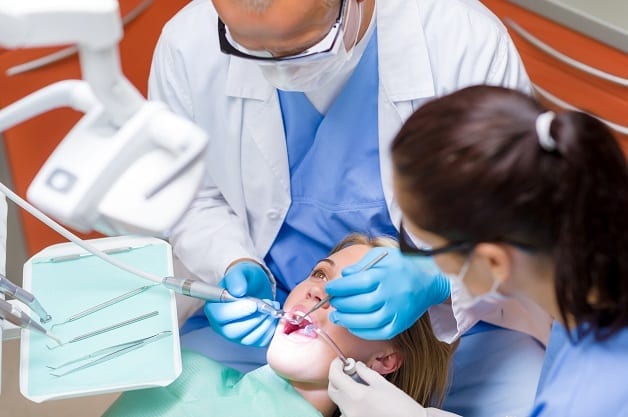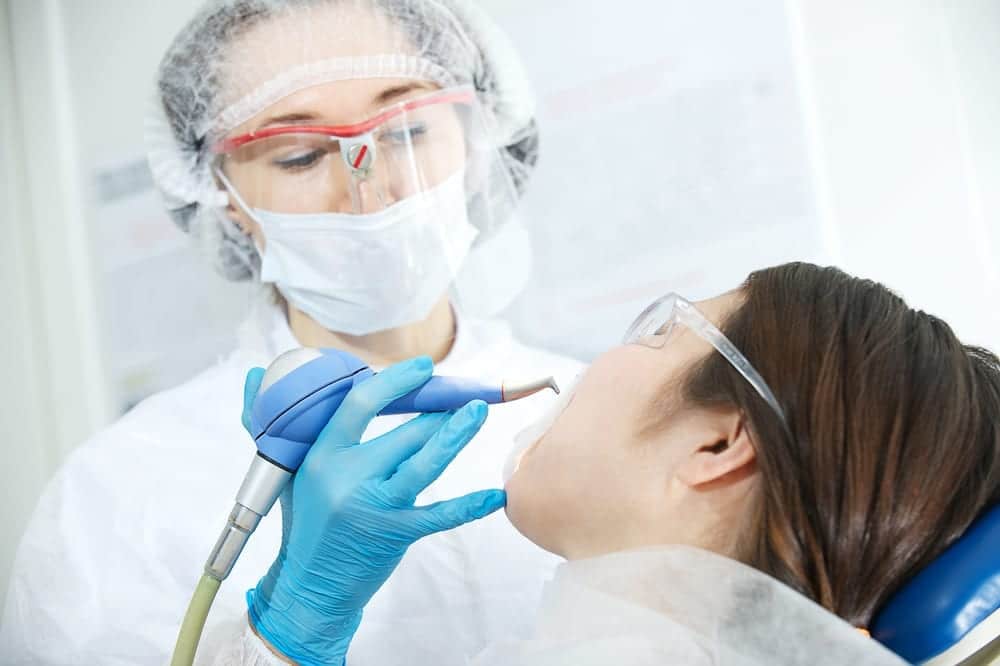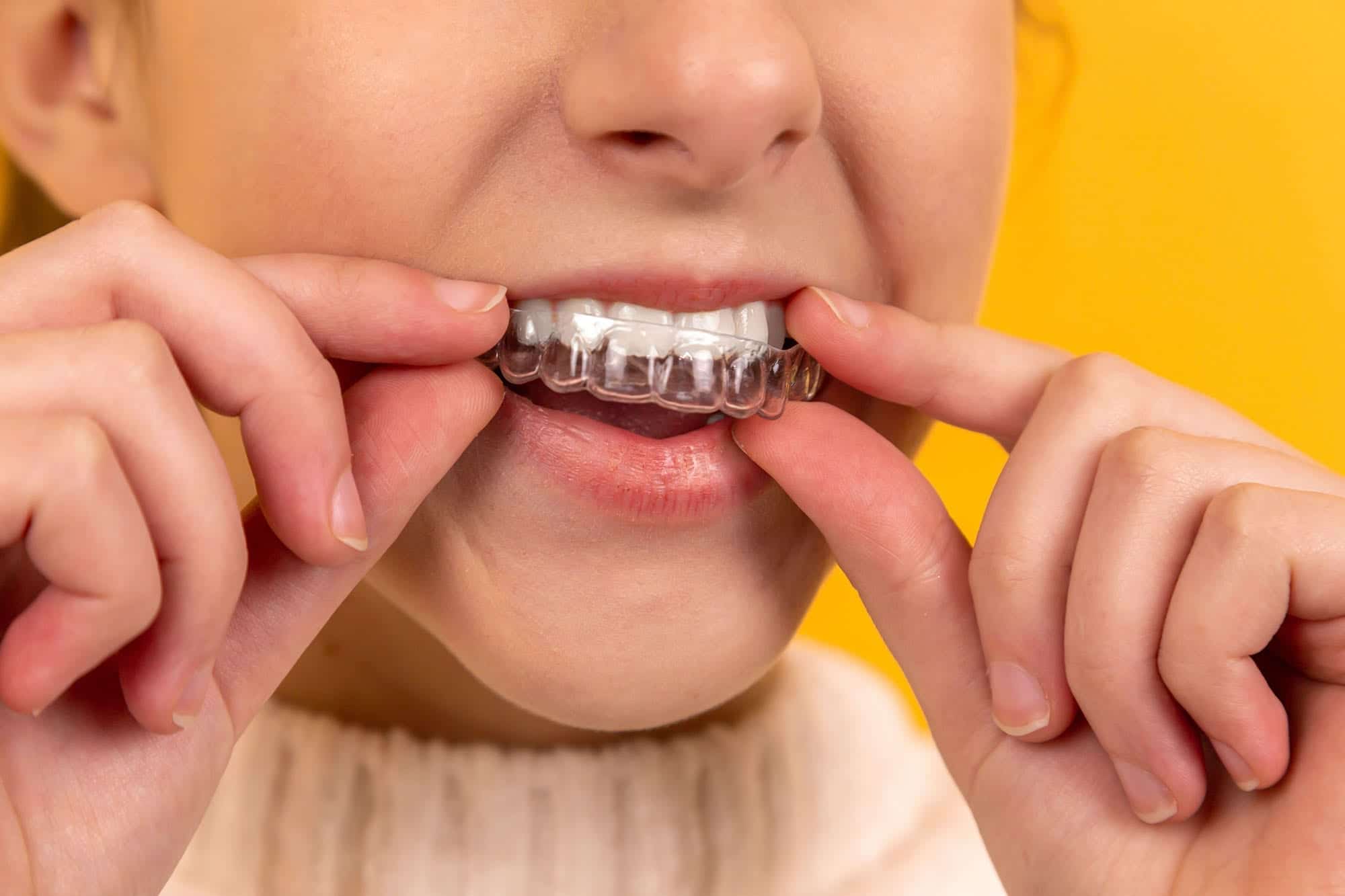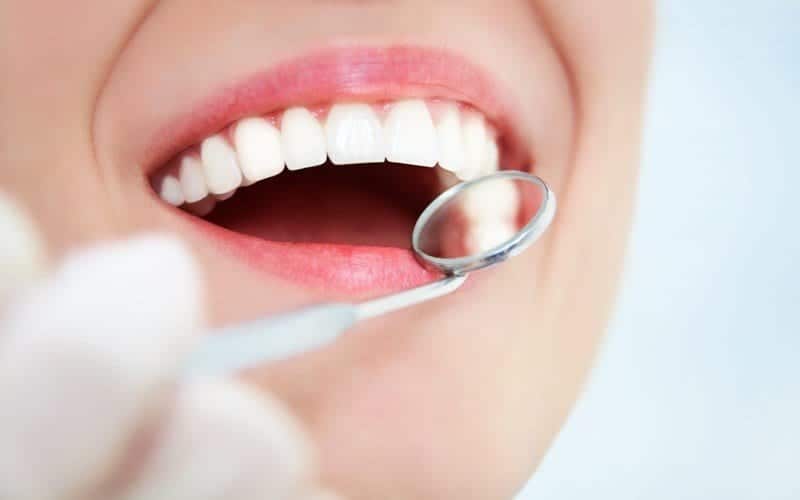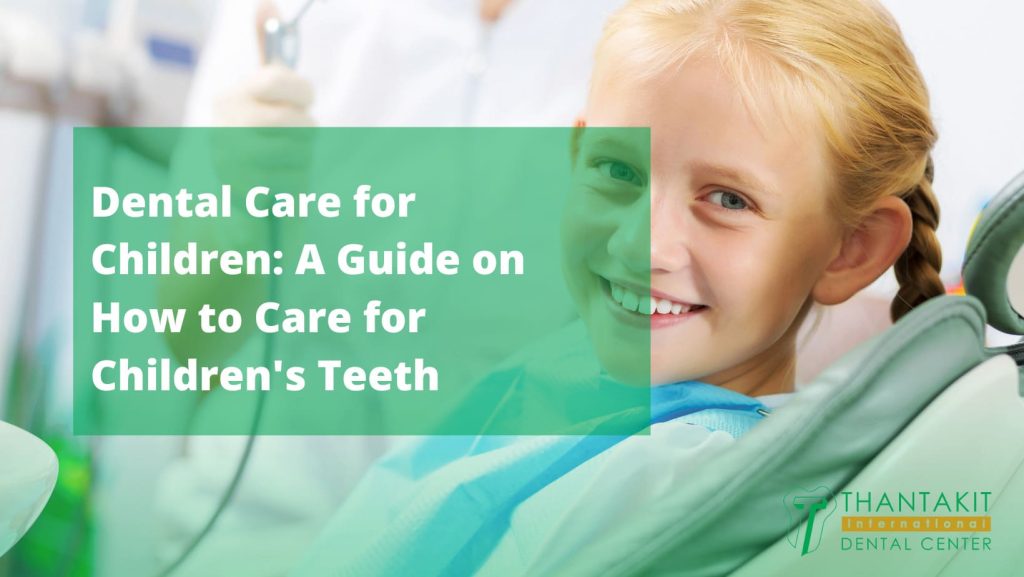Dental Care for Children: A guide on how to care for children’s teeth and gums, including tips on brushing, flossing, and the importance of early dental checkups.
Brushing your teeth, flossing, and gargling mouthwash are important habits to foster whether you’re a child or adult. You should prioritize oral hygiene to avoid losing all your teeth when you’re older.
However, what about dental care for children? How should you go about cleaning your children’s teeth? How do you teach a young child about dental care?
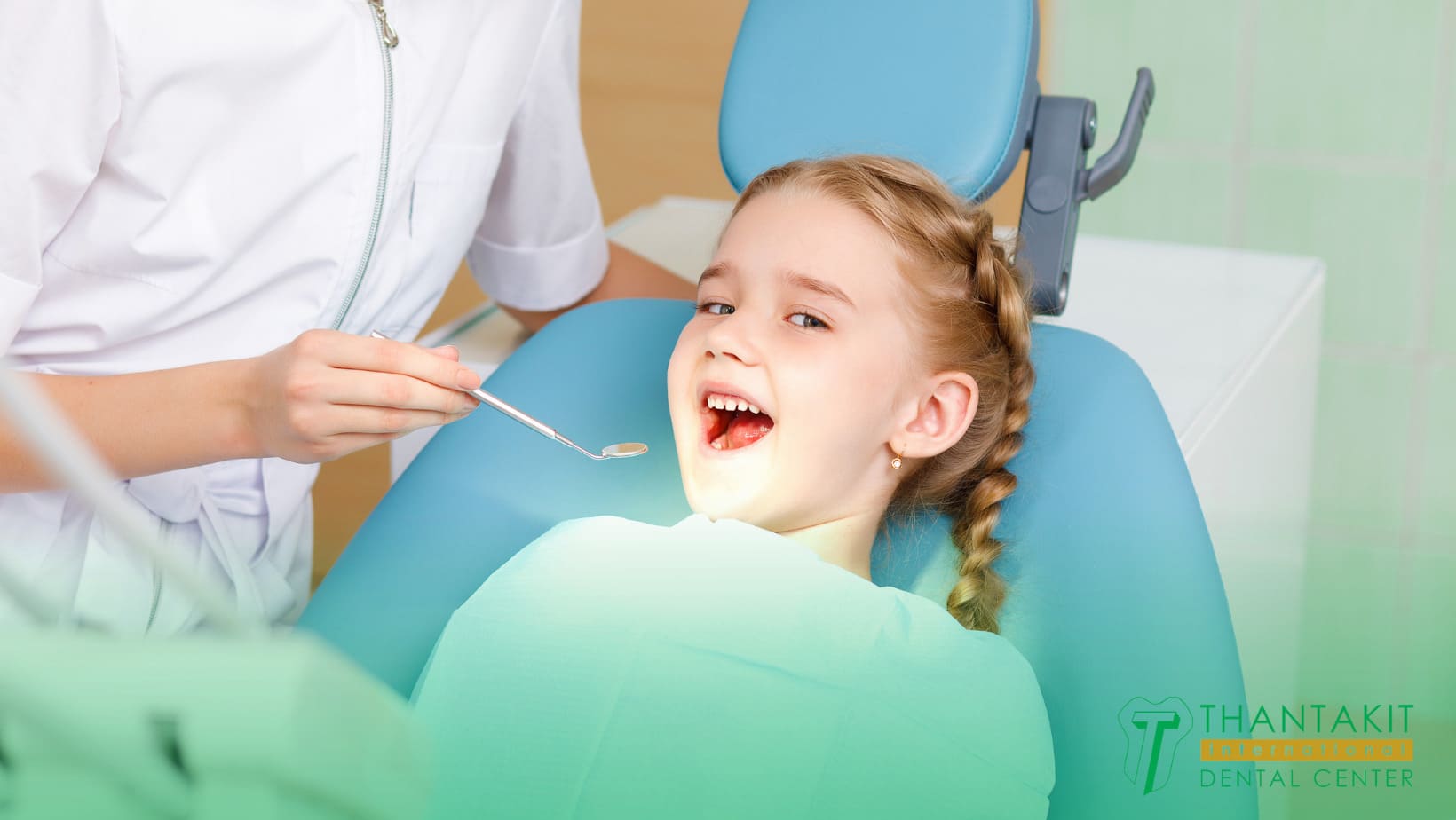
Page Contents
Caring for Your Children’s Teeth and Gums
Keeping your mouth, gums, and teeth healthy can protect both the integrity of your smile and your overall bodily health. In turn, you can safeguard your children’s health by taking care of their oral health.
It’s important for children to form solid oral hygiene habits early on with their “practice” milk teeth so that they won’t easily lose their permanent “adult” teeth in the future.
Here’s how you should go about child dental care.
-
Offer Your Child Healthy Meals: Feed your child healthy meals such as whole grains, lean meats, dairy food, beans, fruits, and vegetables. Cut down on his fast food and junk food intake. Learn more about the healthy options to feed your child.
-
Bring Your Children Healthy Drinks: Soda pop and other sugary soft drinks can lead to childhood tooth decay. The sugar from drinks staying inside children’s mouths can create plaque and cause cavities as well.
-
Get Tips for Healthy, Kid-Friendly Snacks: Instead of potato chips and cola, you should feed your children kid-friendly snacks like crackers, milk, juice, yogurt, and fruits (like apples and oranges). Avoid giving them overly processed snacks too.
-
Ensure That Your Child Gets Enough Calcium: You can feed your child milk and supplements to raise his calcium dosage. The mineral helps make teeth and bones strong. Additionally, yogurt and cheese are also good sources of calcium.
-
Have the Child Consume Fluoridated Water: In some cities and towns in the U.S., the tap water is fluoridated. Adding fluoride to your drinking water helps strengthen teeth, which is why most toothpaste brands also contain the ingredient.
-
Check If Your Tap Water is Fluoridated: Call your local water company or city hall to inquire if your tap water has fluoride added to it. You can also ask your dentist or doctor for fluoride supplements in case your tap water lacks fluoridation.
-
Ask Your Child’s Pediatrician about Fluoride Varnish: Ask your family dentist, children’s dentist, or pediatrician about fluoride varnish. It’s a product that allows you to put a thin coat of fluoride onto your child’s teeth. The varnish is an effective method of preventing tooth decay.
-
Good Oral Health Helps Ensure Good Overall Health: Keep in mind that taking care of your child’s oral health can also impact his overall bodily health. His health depends on how clean they can keep their teeth and mouth, which protects him from bacterial infections, plaque, and gingivitis.
-
Fight Their Tooth Decay: To fight childhood tooth decay, do the following things for the sake of your children’s oral and dental healthiness.
- Give your children water to drink in between meals.
- After every meal, offer them some juice or milk to drink as well.
- Obviously, teach them to clean their teeth after meals when they’re old enough to do so. More on this in the later sections of this guide.
- If your children are the right age, then start using fluoride toothpaste to clean their teeth. The mineral also assists in protecting teeth from decay.
- If you have a baby, don’t put him to bed with a bottle of milk. Be aware that milk formula can stay on your child’s teeth overnight, increasing his risk for dental caries.
Both parents and children should take good care of their teeth. After all, oral hygiene prevents issues like bacterial contamination of the bloodstream, heart attacks, and stroke. It does more than just prevent cavities or keep your child’s smile pearly white.
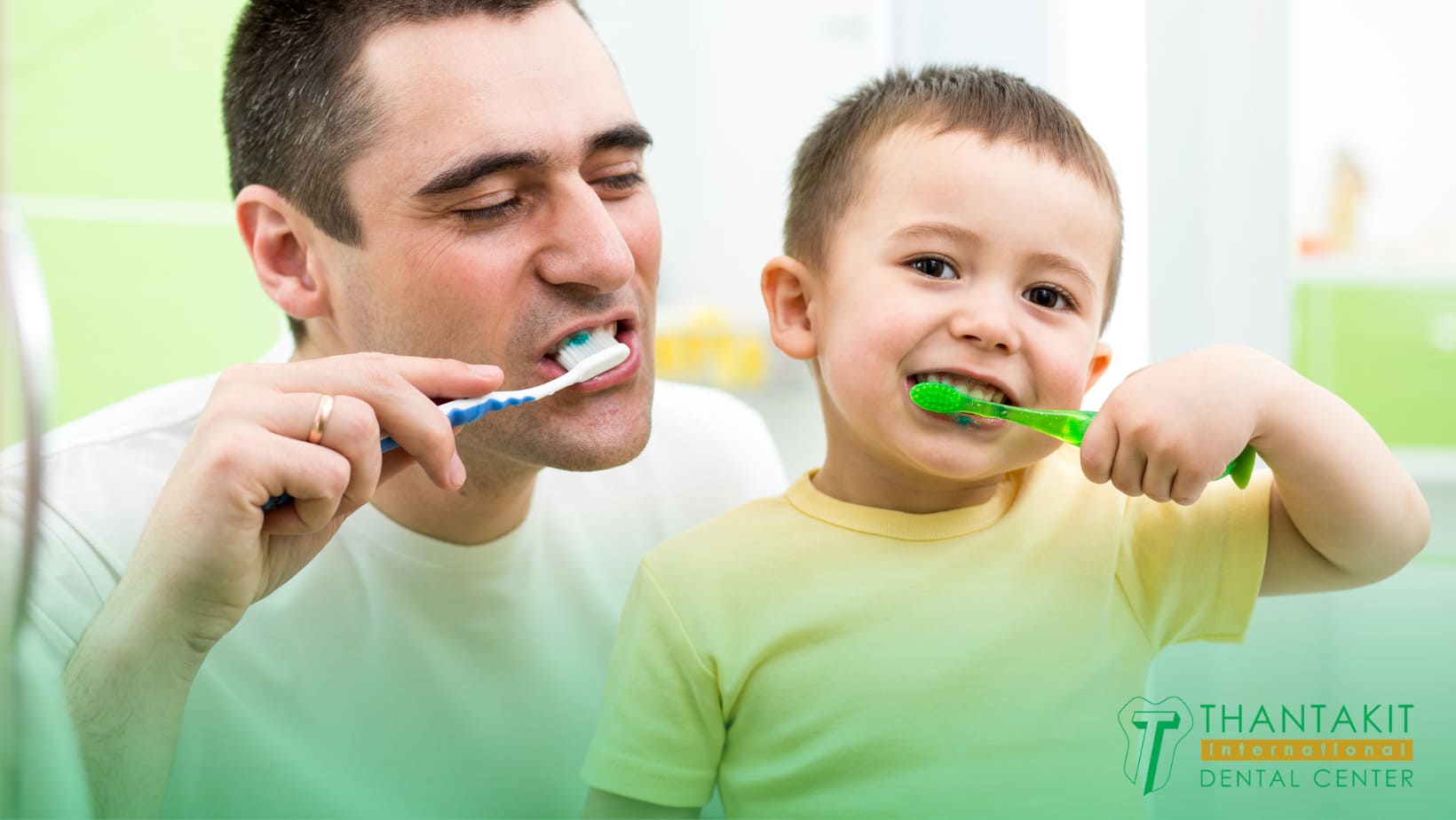
How to Brush the Teeth of Children of Varying Ages
Parents should take good care of the teeth of newborns and children younger than 2 years old. Meanwhile, children older than 2 years old should learn how to brush their teeth and observe proper dental hygiene on their own.
Older children should clean their teeth after every meal by themselves, from breakfast to dinner—or at least once in the morning and again before going to bed.
-
Tooth-Brushing for Infants or Newborns: Use a soft toothbrush made for babies and plain water if you’re taking care of a baby’s first tooth or teeth. Do this twice a day, particularly before bedtime.
-
Tooth-Brushing for Children Younger Than 2 Years: Ask your dentist or doctor if your child that’s younger than two years of age can start using fluoride toothpaste already. Do the same infant-style dental care routine with them but this time with toothpaste involved.
-
Tooth-Brushing for Children Starting 2 or 3 Years of Age: Teach your child how to brush his teeth twice daily with fluoride toothpaste. Have him use a pea-sized amount of toothpaste to brush his teeth. Get him to spit out the toothpaste after brushing because swallowing toothpaste can result in white-spotted adult teeth.
-
Tooth-Brushing for Children around Age 7 or 8: At around this age range, your kids can start brushing their own teeth without further assistance from you, the parent. Observe them to make sure they do the following things.
-
Make sure they brush all of their teeth.
-
Check if they’re brushing for two minutes every session.
-
Make the act of brushing teeth entertaining to them through games.
-
Remind them to spit out the toothpaste they’ve used instead of swallowing it when they’re done.
Tips on Brushing, Flossing, and Dental Hygiene for Children
A child entering puberty should know how to brush his teeth, floss properly, or use mouthwash. He should also go to his local dentist for a dental cleaning once or twice a year.
He can even indulge in a dental tourism holiday at Thantakit International Dental Center in Thailand. Nevertheless, keep in mind the following tips to help observe proper dental care for children.
-
The Importance of Using Fluoride Toothpaste: As mentioned before, your children should use fluoride toothpaste. Check the label or box to see if your toothpaste truly contains fluoride. It can also assist greatly in preventing tooth decay and cavities like calcium would.
-
How to Encourage Children to Brush Their teeth: It can be a chore for children to brush their teeth on their own regularly. You can make toothbrushing more fun for them by turning it into some sort of game. Here are some of the ways parents can turn dental hygiene into something entertaining for their kids.
-
Choose Their Own Toothbrush Design: Let your child pick a toothbrush with his favorite color, shape, design, or cartoon character emblazoned on it. Just make sure it’s the right size for his small mouth.
-
Shows and Books about Oral Hygiene: Search for shows or books (as well as interactive smartphone apps) sharing stories about tooth brushing. These can encourage the child to start brushing his teeth on his own volition.
-
Two-Minute Song Timer: Play or sing a song to assist the child when brushing his teeth for two minutes. A two-minute or slightly longer song can serve as his timer indicating that he should keep brushing until it ends.
-
Instructional Videos or Programs: Instructional videos or interactive programs can visually instruct children how to go about brushing their own teeth in the correct manner. You can even use such media to teach them how to floss or use mouthwash down the line.
-
How to Floss Your Children’s Teeth: Teach your children how to floss. Tell them that they should use every individual piece of floss to scrape between teeth gaps and surfaces, thus wiping off film or plaque and leftover food bits after every stroke. They should then rinse their mouth with water afterwards.
-
How Children Should Use Mouthwash: The instructions on how to use mouthwash is typically found on the bottle itself. However, for posterity’s sake, tell your child to do the following.
-
Fill the cap with liquid mouthwash.
-
Sip the liquid then gargle and rinse the inside of your mouth.
-
Keep gargling the concoction for about 30 seconds or so then spit it all out. Don’t swallow the mouthwash.

The Importance of Early Dental Checkups
Early dental checkups are important to keep track of children’s dental health at an early age, thus instilling in them the importance of oral hygiene and dental maintenance.
Even though you can avail of a local family dentist for your children’s early dental checkups, you can also get subsequent checkups through dental tourism and holidays at Thailand care of the Thantakit Dental Center.
Regardless, you should help foster trust between your child and the dentist early on. Help your kid avoid developing dentistry phobias by starting their dental checkups early.
-
Taking the Child to the Dentist for the First Time: You should take your child to the dentist at one year old. Ask his pediatrician for the name of the children’s dentist you should visit or consult with. After the first appointment, get a regular dental checkup schedule for the child.
-
Things to Ask the Children’s Dentist about Your Child: Ask your pediatric dentist how to clean your child’s teeth properly. There’s a basic guide about this topic in the previous section, but a paid professional can cover details and considerations unique to your child’s medical history.
-
Assuaging Your Child’s Fears of Dentists: Going to the dentist for the first time can be scary for your kid. It might help him to see you sitting on the dentist chair first before facing the tooth doctor. You can also ask the dentist if it’s okay for him to sit on your lap during the checkup.
-
Cost of a Checkup with ACA: For U.S. citizens, the Affordable Care Act ensures that all American insurance plans must include coverage for children’s dental care. Depending on your insurance provider, you might be able to get full coverage dental care or partial discounts. Talk with your insurer for more info.
-
Medicaid and CHIP Assistance: It’s also possible for your child to qualify for low-cost or free health insurance through Medicaid or CHIP (Children’s Health Insurance Program). Search the Internet to learn more about your options for pediatric dentistry insurance.
-
Out-of-Pocket Expenses with Dental Checkups: A child’s dental checkup costs $65 to $100 on average. It’s done once or twice a year. For sealant treatment, its price is from $35 to $40 per tooth. However, if you lack insurance, you can get low-cost or free dental care through health centers and special clinic offers.
-
What’s This About Dental Sealants? Dental sealants are thin plastic material put on the surfaces of back teeth to protect them from tooth decay. Ask your dentist if your child is qualified for this type of dental procedure.
How to Practice Good Adult Oral Hygiene
It’s always best for parents to teach their children about oral hygiene through example. A child will always look up to their parents for advice and guidance in everything, including dental care.
There are plenty of ways for you to improve your oral and dental hygiene habits that your child can pick up on beyond merely knowing how to brush your teeth. Lead by example. Show them how to properly maintain their teeth by doing so yourself!
-
Brush Your Teeth Twice Daily: Dentists used to recommend, “Brush your teeth after every meal”, but at present, it’s fine for you to simply brush after breakfast and before bedtime. Make it a point to use fluoridated toothpaste and brush for the whole two minutes.
-
Use Dental Floss Daily: Floss at least once a day, like after a big lunch or before bedtime. Use dental floss instead of wooden toothpicks that could prick your gums or get splinters stuck between your teeth. Consult your dentist or dental hygienist on how to correctly floss.
-
Gargle with Mouthwash or Use Home Tools: Commercial or medical mouthwash is readily available to you in groceries and pharmacies. You can also utilize home tools like the water flosser or the vibrating electric toothbrush to keep your gums and teeth in tiptop shape.
-
See Your Dentist Once or Twice a Year: Go to your dentist like it’s a yearly tradition or holiday, such as Thanksgiving or Christmas. Go to them in six-month to one-year intervals to help him keep tabs on the state of your oral health and dental cleanliness.
-
Do More Than a Checkup: Be thorough with your dental checkup. Get regular dental exams, X-rays, and cleanings. This will help protect your smile while getting ahead on issues like gingivitis and periodontal disease. Seeing your dentist regularly can also decrease your risk of not only tooth loss but also stroke.
-
Make an Appointment with a Periodontist: A periodontist is a periodontal disease and gingivitis specialist. He helps take care of your gums and keeps your periodontal ligaments from dying out due to neglect. He also assists in ensuring your jaw and gums are healthy in ways a general practitioner dentist couldn’t.
-
Have a Dental Wellness Holiday: Another way to get an affordable dental checkup is to go about it like it’s a Thailand holiday. You can make this possible through Thailand dental tours at places like the Thantakit Dental Center. This can save you money because it combines Thai vacations with your dentistry needs.
Thantakit’s dental service rates are so affordable they’re cheaper than western rates even when you take travel costs into consideration! The dental center offers affordable dental checkups, procedures, and restorations to ensure you and your child a clean bill of health.
They’re also supported by some of the best internationally trained dental doctors, specialists, and general practitioners around.
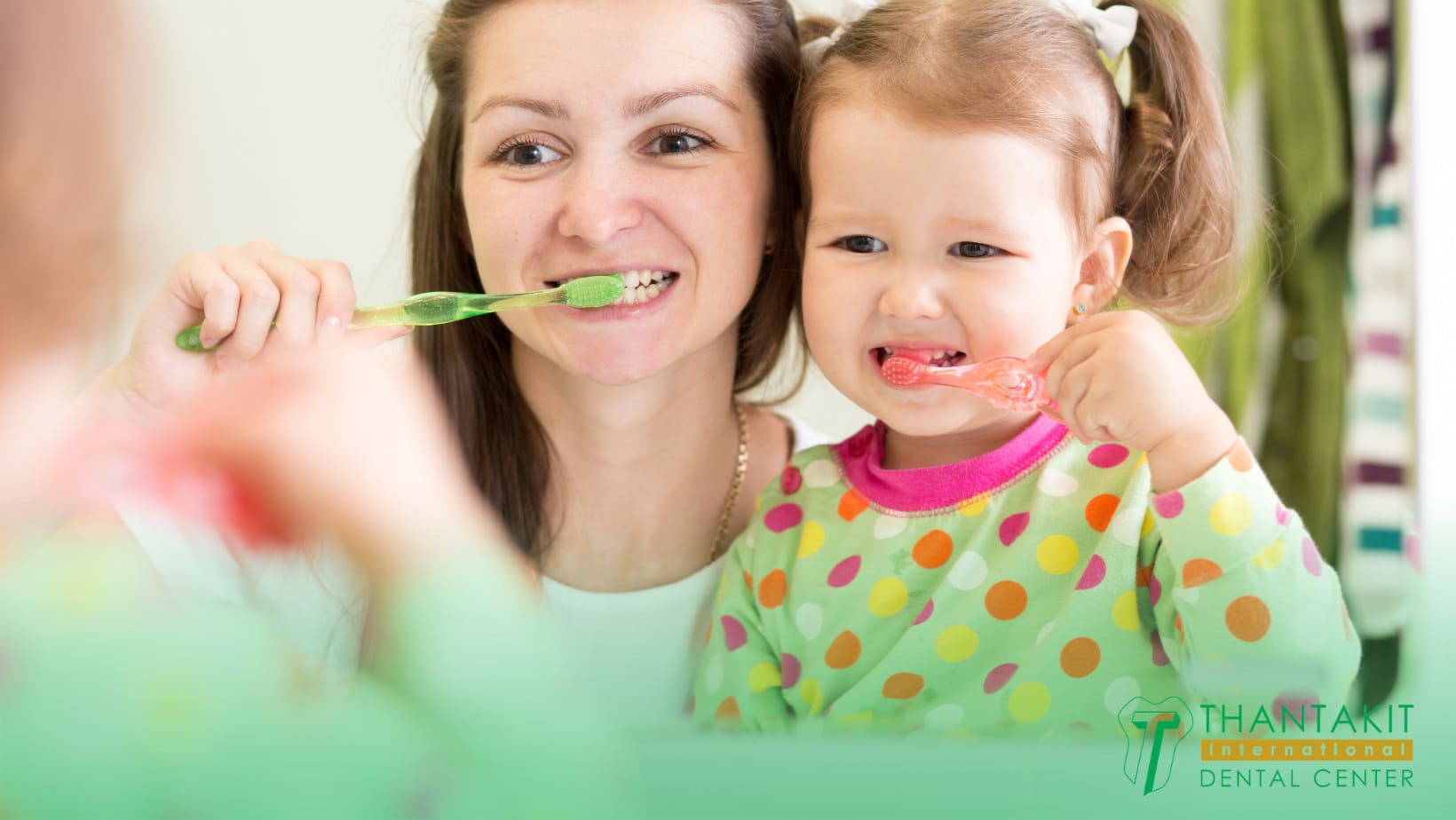
Taking Care of Your Children’s Oral Health
Take better care of the oral health of your children by teaching them how to brush their teeth when they’re old enough. Show them how to floss and use mouthwash for good measure.
Helping them become more involved in keeping their own mouths, gums, and teeth clean daily will help ingrain into them a sense of discipline and responsibility.
Teach your kids the value of a well-maintained smile and remind them that dentists are only looking out for them and their future dental health as well as their overall health. Instilling a sense of dental self-maintenance is the essence of dental care for children.
Thantakit International Dental Center is Thailand’s longest established dental center. Situated in Bangkok, our clinic is renowned across the world as a destination for world-class dentistry, with most of our patients flying to us from Australia.
Just contact us today and get a FREE dental consultation!



